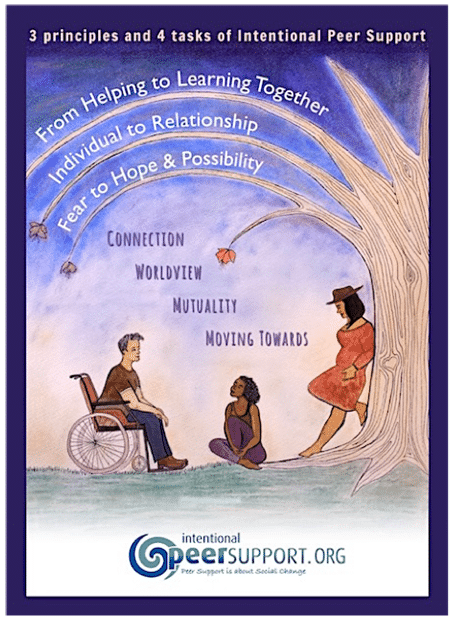National Recovery College Offer for people with Lived Experience (Peers) working in Mental Health Services across Wales
Intentional Peer Support Core training
10 sessions over 5 weeks:
Monday 8th & Tuesday 9th Jan
Monday 15th & Tuesday 16th Jan
Monday 22nd & Tuesday 23rd Jan
Monday 5th & Tuesday 6th Feb
Monday 12th & Tuesday 13th Feb
Each session will be: 10am – 2pm
LOCATION:
Online training (An all Wales training)
ATTENDANCE:
You must attend and fully participate in a minimum of 90% of the course time if you would like to receive an IPS core training certificate. The course commitment and training is demanding and includes content that may be emotionally challenging for participants (e.g. we discuss trauma, suicide, conflict and self-harm). We encourage participants to consider whether they are in a place within their own personal Recovery, to consider if they are able to actively engage in open conversation about challenging topics and share experiences where relevant. We also encourage participants to reflect on what they might need to create space in their lives and learning environment for this to feel possible.
PRE REGISTRATION REQUIREMENTS:
This is a unique opportunity for peers working in mental health & lived experience services across Wales to attend IPS core training. Please only register your Expression of Interest if you:
• Have life interrupting lived experience of mental health challenges or trauma.
• Intend to use this experience in a peer support / volunteering role in the present or in the future in Wales.
• Are able to attend 90% or more of the course.
• Can manage your own self-care and wellbeing whilst attending the course.
REGISTER YOUR EXPRESSION OF INTEREST:
To register your Expression Of Interest (EOI), please create a short personal statement answering the specified questions below. Please email your EOI to:
Catherine.Maddock2@wales.nhs.
EOI Deadline: 18/12/2023
EOI PERSONAL STATEMENT QUESTIONS:
1. What interests you in applying to attend IPS Training?
2. How do you intend on utilising the IPS Training in your current / future work & practice?
3. Do you have lived experience of mental health challenges and / or trauma?
4. What potential benefits do you foresee the IPS training having on understanding how to share your lived experiences meaningfully to support others?
5. Given the emotionally challenging nature of some of the content, do you feel able to manage your own mental health challenges & wellbeing needs, to enable you to complete the intensive 10 session IPS course?
6. Are you able to commit to the full 10 half days of training (4 hours per day)?
7. If your EOI was to be successful, do you have any specific needs that the trainers should be aware of to help with your learning experience?
By sending in your EOI, you agree to be contacted by us about future IPS opportunities, including an all Wales Co-reflection group as well as other peer support / lived experience related content / training opportunities that may be relevant.
*Please see below for information on IPS and what it’s philosophy is about.*
During the 10 sessions, participants will learn the IPS tasks and principles in a highly interactive learning environment. We will explore ways to create mutual relationships where power is negotiated, co-learning is possible and mutual support that goes beyond the traditional notion of “service”.
If you do not meet the eligibility for this course but are interested in IPS training please contact us to discuss options.
WHAT IS IPS?
“As peer support in mental health proliferates, we must be mindful of our intention: social change. It is not about developing more effective services, but rather about creating dialogues that have influence on all of our understandings, conversations, and relationships.” – Shery Mead, Founder of IPS
Intentional Peer Support is a way of thinking about and inviting transformative relationships. Practitioners learn to use relationships to see things from new angles, develop greater awareness of personal and relational patterns, and support and challenge each other in trying new things.
IPS is unique from traditional human services because:
• IPS relationships are viewed as partnerships that invite and inspire both parties to learn and grow, rather than as one person needing to ‘help’ another.
• IPS doesn’t start with the assumption of a problem. With IPS, each of us pays attention to how we have learned to make sense of our experiences, then uses the relationship to create new ways of seeing, thinking, and doing.
• IPS promotes a trauma-informed way of relating. Instead of asking “What’s wrong?” we learn to ask “What happened?”
• IPS examines our lives in the context of mutually accountable relationships and communities — looking beyond the mere notion of individual responsibility for change.
• IPS encourages us to increasingly live and move towards what we want instead of focusing on what we need to stop or avoid doing.
For more information about IPS please visit:

